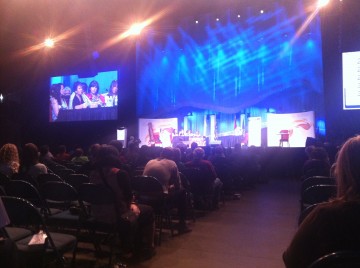“They call it ‘Residential School Syndrome’, and it just goes on and on and on.” These words from Leonard Alexcee, a survivor of the Port Alberni Indian Residential School, as he shared his story with Justice Murray Sinclair and an audience of witnesses at the Pacific Coliseum on the first day of the Truth and Reconciliation Commission’s British Columbia National Event.
Reflections: September 18th, 2013 TRC Event
Darryl Hol is a first-year Master of Journalism student at the UBC Graduate School of Journalism. Follow him @darrylhol.
“They call it ‘Residential School Syndrome’, and it just goes on and on and on.” These words from Leonard Alexcee, a survivor of the Port Alberni Indian Residential School, as he shared his story with Justice Murray Sinclair and an audience of witnesses at the Pacific Coliseum on the first day of the Truth and Reconciliation Commission’s British Columbia National Event.
His was a sentiment shared by many on Wednesday: that although the last Indian Residential School finally closed its doors in 1996, the suffering endures.
It endures for what the Commission has termed “inter-generational survivors”, or “survivors of survivors” in the words of Justice Sinclair. Survivor Margaret Commodore explained that learning how to be a good parent was taken away from her when she was ripped from her own parents’ arms. She took her opportunity in front of the commission to apologize for the “dysfunction imposed on my own children”.
It endures in our education system, where Starleigh Grass of the First Nations Education Steering Committee told the Commission that negative stereotypes towards Aboriginal students in British Columbia’s education system still prevent progress.
And of course, it endures in the memory of survivors. Commodore spoke of being unable to forgive her abuser, who took so much away from her. Alexcee spoke of becoming an alcoholic in an effort to bury his memories. Survivor Sainty Morris struggled to recount stories that haunt him to this day.
Most – like Alexcee, whose wife heard his story for the first time as he spoke to the Commission – have suffered alone.
The British Columbia National Event is set against this backdrop. It’s an opportunity for all of those affected by the legacy of Indian Residential Schools to come together with witnesses. It’s an opportunity to build understanding through the gathering of truths, and it’s an opportunity to hopefully move forward through reconciliation.
As one survivor told the Commission at a prior event, “We need to stop walking into our future backwards.” This week’s event is an important step in turning around.
